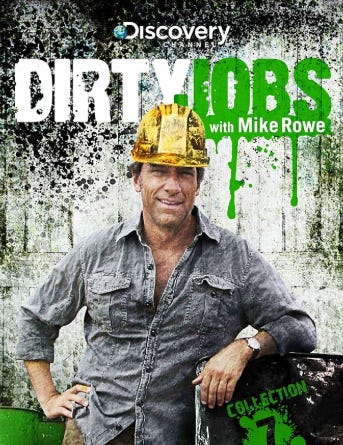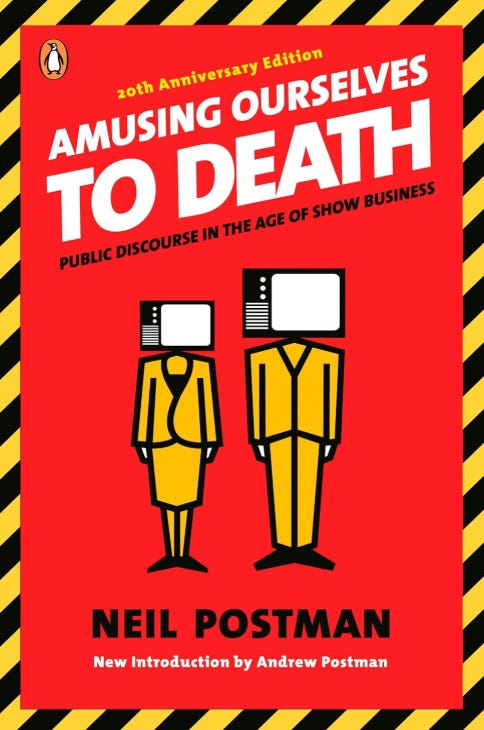Your Country Needs You to Ignore Trump's Inauguration
Paying attention on January 20th will make you a less informed and worse citizen. Tune it out.
This essay will beg you to keep your TV off on Monday for Donald Trump’s second inauguration. But this isn't about 'normalizing Trump' - it’s not about him! Watching any inauguration of anyone, anytime is detrimental - better to tune it all out.
Can you feel that something is wrong?
"Turn on, tune in, drop out" said Timothy Leary in 1966. It was a call to America’s young people to literally “drop out of school…don’t politic; don’t vote”. What should the emerging adult baby boomers do instead? “Tune in with natural things,” Leary advised, while his followers tripped on LSD behind him (he was likely tripping too).
Mr. Leary’s message is easy to dismiss with a chuckle. His thesis of rejecting western education is undermined by his counteroffer: let vast quantities of psychedelics teach you instead - not just a recreational trip, let ‘em melt the ol’ brain. No thanks.
Still, the sense that something was wrong with the education of young people in the 60’s resonated. As my favorite grad school professor Dr. Leonard Steinhorn told us: students in that era resented going to college for what they perceived as the sole purpose of becoming good worker bees for corporations. Was there nothing more to education than learning to be a cog in the machine? Some boomers went on decades later to admonish millennials for asking the same kind of question.
Education can be many things. We might imagine Aristotle’s Lyceum, a place of philosophical debate, where learning was truth-seeking. We might romanticize an Enlightenment-inspired German University in the 1800s, where learning was “pure” pursuit of “knowledge for its own sake”, as Socrates had told us to do two thousand years earlier 1. Or we can imagine education today, often a mixture of liberal arts and practical job training (if not an exclusive blue-collar apprenticeship).
Which model is best, ‘pure education’ or ‘practical’? Some like Mike Row giggle at nerds who think school is for more than prepping yourself to do Dirty Jobs. Get a real man’s job, like being a TV presenter, you betas!
If you ask me, most higher education should lean towards ‘pure’ knowledge-seeking. Nonetheless, institutions should be accountable to the necessities of the modern economy, otherwise it will cease to be relevant to large segments of the population.
And if higher education becomes irrelevant, the people who don’t get higher education won’t experience the true benefit: becoming a well-rounded citizen.
To be a well-rounded citizen, to be one who has knowledge and can engage with society virtuously, this is the purpose of education.
What the hell does this have to do with Trump’s Inauguration?
Here’s where I’ll intersect with Monday’s festivities: if you wish to be a well-rounded citizen, the inauguration is a detriment to that goal; if the inauguration is educational at all, it is the wrong kind of education.
Even if his prescription was absurd, in telling us to “turn on” and “drop out” Mr. Leary was onto something: sometimes the things you think are educating you are hurting you.
Today, the thing hurting us is our performance of being ‘informed’.
If you’re anything like me, at some point in your life you became a news junkie. In fact, when I first started creating content on YouTube, I called myself The Political Junkie. For me, this meant watching endless cable news coverage, reading opinion pieces, tracking polling - “What might happen in Wisconsin’s 6th congressional District at the mid-term elections?” I might ask, having never stepped foot in Wisconsin. The more news content I could cram in, the more informed I’d be. Wrong.
The vast majority of the news content we consume is doing the opposite of what we pretend it’s doing. First, nearly any and all information news brings you is information you cannot act on. Second, it is barely providing any information anyway; it’s almost all superfluous garbage.
Your favorite indignant nightly newscaster? Trash.
That one partisan tweeter you think is clever? Rubbish.
The podcaster/talk radio personality who tells it like it is? Feces. (yes, I ran out of synonyms for garbage)
The point of these news programs is not to help you learn about current affairs. That’s a facade. They exist to performatively skim the surface of headlines to heighten your emotions so you stay tuned in for advertisers. That’s it.
“Well, ok, maybe my preferred news isn’t giving me deep-dives into public policy, but at least I roughly know what’s going on in the country.”
Wrong again. There is evidence that some cable news can literally make you less knowledgeable about the world around you. As you might expect, social media is particularly good at making you feel informed while making you ignorant. ‘Soft news’ programs like The View, meant to appeal to people less likely to pay attention, can often turn people away anyway.2
There’s a deeper dynamic playing out here. Remember that television and social media are not designed to inform, they are designed to entertain.
In his influential 1985 work Amusing Ourselves to Death, author Neil Postman, building on The Medium is the Massage by Marshall McLuhan, argues convincingly that we lose something by supplanting the written word with video. By replacing the long, logical flow of writing with a medium whose primary function is entertainment, we reshape how we think. In Postman’s time, the television was the main preoccupation. Today, we could add social video, like YouTube or Tik Tok.
I think my basic argument could slot in well with what Postman would say were he alive now: by engaging with screens for information, we are acting against our goal of being informed. Instead, we are hiding behind the premise of news to seek entertainment. A news junkie is only different from a sports fan in that a sports fan is honest in admitting what they’re watching isn’t actually meaningful. The news junkie, by contrast, lies to themselves and to us that watching infotainment programming is accomplishing anything.
Think of news like a cut of meat. A ‘just-the-facts’ wire service like the AP is the leanest cut, offering snippets of events with minimal context and commentary. A traditional newspaper article is a sirloin steak: the meat is there, with a small line of fat (context and opinions) on the side.
To extend this metaphor to its absurd extreme, cable and social media news represent the fattiest steak of your life. If there was any meat (information) in the cut, it’s totally overwhelmed by chewy, disgusting mush (opinions filtered for angry engagement).
Can you get some protein by eating an absurdly fatty steak? Sure, but you’ll get mouthfuls of rancid fat to stick between your teeth for your trouble. In the same way, can you get some bits of information by consuming modern news? Sure, but you’ll get earfuls of rancid ‘hot-takes’ to stick between your ears for your trouble.
“Ok, well, this is how I prefer to get my information. And as long as I get some information and filter out the noise, that must be good, right?”
Wrong. Wrong. Wrong. Just having factoids of current events is not helping.
To be a well-rounded citizen, to be one who has knowledge and can engage with society virtuously - this is the purpose of education. If we consider that consuming news as adults is an extension of our education, we must conclude that we are failing ourselves.
To be a well-rounded citizen, we need knowledge and to be able to engage virtuously using that knowledge.
So here’s a question: what can you actually do after watching the nightly news? Let’s be generous, it’s the most high-brow news program you know. The newscaster has a deep voice and uses that ‘newscaster cadence’, the information (yes, information!) is presented in a fairly objective way, and the correspondents ask tough but fair questions to the powerful.
You’ve just finished the program and learned of something troubling happening somewhere in the country or wider world. What will you do with this information?
Answer honestly. You’ve learned about a natural disaster, a war, a corrupt politician, a manmade famine - what actions can you actually take? Better framed: what difference can you actually make?
The answer is very little. Not nothing, but very little.
You can write a letter to a representative, fund a charity or campaign, volunteer and vote.
I have bad news. Better if you sit down: in the grand scheme, that’s basically nothing. Even if you do all those things, you aren’t likely to change much. The cultural truism is that one person can make a difference, but the truism doesn’t account for size. The difference of one person is in most cases small. Sorry.
Is this an appeal to nihilism? Everything is worthless? Never learn about current events? Never speak up about injustice? “Drop out” of life and discard empathy?
No, not at all. In fact, I’ve written this piece out of empathy for you, for myself too.
Time to drop the cynical act
Chances are, if you’ve read this far, you care a lot. Me too. Good for us. We should care. And yes, we should act on the issues we care about in accordance with the values we hold.
That’s why I moved to Washington, D.C. to attend an MA program in Political Communication. That’s why I write. That’s why I create. It’s a burning desire for justice, a need to make a difference, no matter how small. I am compelled to know, compelled to be that well-rounded citizen so others might be too. If we could all be such, how suffering would reduce and flourishing would triumph!
Therefore, this is not a judgement of your news-watching habits. I’ve been there. This is not a condemnation of your desire to watch the inauguration on Monday. I’ve watched every inauguration since I was old enough to do so. This is an appeal to focus your energy.
The question is not: should you tune out 100%? The question is: how can you tune out noise to focus on the largest difference you’re able to make?
Which finally brings us to Monday’s Inauguration…
Even if you didn’t support Donald Trump in November, you’re likely planning to watch his inauguration on Monday. Why? Before this diatribe of mine, you may have planned to watch out of a sense of responsibility: ‘I don’t like the guy, but it’s my duty as a citizen to be informed.’
So let’s run these assumptions through our little well-rounded citizen algorithm.
Can you learn things by watching the inauguration? Not much. Hopefully I’ve convinced you by now that coverage before and after the ceremony is worthless entertainment disguised as information. At best, coverage provides factoids; at worst, cable and social media coverage will make you more angry and ignorant for having ‘learned’ from them. So the inauguration coverage fails the first test.
But again, let’s be generous. Let’s imagine you find the most straight-edge inauguration coverage you can on PBS or CSPAN. You tune in only a few minutes before the swearing-in, and tune out as soon as President Trump’s speech is complete. Isn’t this a more responsible way to engage?
I’ll give it to you, it is. However, we should apply the other half of our well-rounded citizenship algorithm: can you engage virtuously with society after watching the inauguration? In other words, can you take action after hearing what Trump says?
Perhaps the few actions we mentioned earlier (protest, vote, donate), sure. As we’ve learned, these might make the smallest difference. But the whole affair comes at a great cost to you, and thus to the world.
If you watch on Monday, it’s likely to be a multi-hour engagement. You turn on ahead of time, listen to commentary, scroll for news updates, watch the ceremony, listen to the post-analysis, learn about day-one executive action. After it all, you’re riled up, so you probably just end your day depressed and exhausted. At best, you take the tiny actions to make a small difference.
Instead of that, I’m begging you to see this as a zero-sum game for your mental wellbeing and your physical energy. Make a different choice on Monday.
Instead of watching news coverage, watch a movie you love. Instead of observing the lingering shot of Trump walk into the rotunda, go for a walk yourself. Instead of getting mad at a speech, consider how you’ll get enough fiber in your diet and have regular bowel movements. I’m serious. Call your mom or a long-lost friend. Just don’t watch the damn inauguration!
If this whole write-up has inspired you to replace news entertainment with content that can truly inform, that’s fine too. At noon on January 20th, read a non-fiction book or a long article on Substack. Find deeper ways to engage with the world’s problems, factoring in that you won’t be able to solve them alone. By all means, if you’re already a well-rounded citizen and in a good mental space, sure, read the speech the day after and take the little actions that you can take.
But my larger point is that you not only deserve a better balance in consuming politics, it’s better for us all if you are strategic with effort. The world needs you fit and ready, not exhausted and grasping at little bits of straw.
Taking care of yourself is a part of being a well-rounded citizen. Saving energy for the fights you can make a large difference in (perhaps at the local level) is an act of love for your neighbors and wider world. Realizing that national politics is something you can only have a small impact on, and thus should give small energy to is a revelation that you shouldn’t feel bad about. It’s ok. It really is.
Say it with me: “I can be a better citizen if I don’t watch the inauguration.” Doesn’t that feel good?
This might serendipitously be in comportment with your emotions about the inauguration already. You didn’t really want to watch. The entertainment aspect of news feels empty anyway when democracy is on the line.
And that’s just it. It isn’t your job to save democracy, and watching the inauguration isn’t helping any of us to do so in any case. So just turn it off.
But William! Isn’t tuning out current events a privilege? Millions of people won’t have the privilege of ignoring politics in the next four years. To ignore the inauguration is to dismiss the poignant plight of the downtrodden - how convenient for you and your emotional wellbeing to switch off the television!
No. On the contrary. It’s a privilege to waste energy being entertained by news coverage and ceremony, then pretend all your manufactured anger isn’t detrimental to your ability to be a well-rounded citizen - to know about the world and engage virtuously with it - to pretend all the drama you subject yourself to has a positive effect for people for whom you feign concern.
You’re full of it.
Therefore, for Monday’s Inaugural, consider the wise words of System of a Down, “It’s a violent pornography, the kind of shit you get on your TV…turn off your TV!”
https://www.jstor.org/stable/178570 O’Boyle “Learning for its Own Sake” 1983








I couldn't agree more. I love your point that news programs "exist to performatively skim the surface of headlines to heighten your emotions so you stay tuned in for advertisers."
There is nothing virtuous about simply knowing what's going on. As I wrote in my own election reflections post, it seems as though many people are operating as if they'll live forever. As if spending literally all day consuming the news–reading it in the morning, listening to it in the car, listening to it on headphones while cooking, watching it at night–is not a waste of time, accumulating to years of your one precious life. Do you want to doomscroll until you die?
This is a very convincing diatribe. Thank you for this. My parents are news junkies, but I will find an excuse to take them outside for something pleasant rather than the alternative. My whole family deserves a break from the fattiness of the American news media. Infotainment is a apt word, but I contend that it isn’t even information- to say so would be too kind.